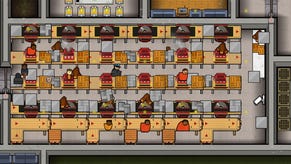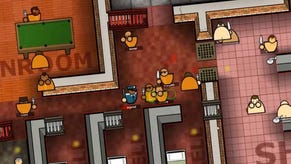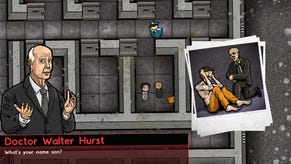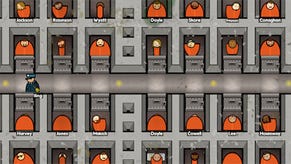Prison Architect interview: putting the triple-A market on trial
Prison Architect is the grim new sim title from indie studio Introversion. VG247's Dave Cook speaks with the dev about death row, shanking and the poor treatment of indies in the console market today.
Introversion is not a triple-a studio. It does not have the luxury of bottomless bank vaults set aside for marketing spend. There are no bleach-toothed, genetically perfect spokespeople peddling the game from a carefully-prepared PR script. They are just two guys making games in a maze of falsities and mirrors.
Their latest project is Prison Architect, a striking sim title that is being funded through an iterative alpha process, similar to Notch's fund-raising efforts with Minecraft. For Introversion, the walled garden of console distribution leaves a sour taste in the mouth - the cost of entry too high, and the potential returns too low.
The developer is on to a winner, as Prison Architect is one of the most emotionally engaging titles you will play this year. The game is now in alpha, and although it may look like a simple sim title - closely akin to Theme Hospital - it delivers a soul-piercing stab that asks some taboo but powerful questions.
Your first story mission tasks you with building a small, but fully-functioning prison that will house some truly despicable people - the bottom rung of both society and morality. The process of actually fashioning the facility becomes slightly disturbing as that classic sim game mentality starts to kick in.
You start to stress over the size of holding cells, whether or not the prisoners have enough light, if you should grow grass everywhere to make their stay more bearable, forgetting that many these men have carried out heinous acts. It's a lesson in morality.
Then of course you can choose to add an execution chamber, solitary wing and morgue to your prison, and then you really have to ask yourself questions about how the inmates should be treated. You are essentially playing with their lives and they are yours to take away as you see fit.
It's a chilling experience, but this is why it's also garnering a swelling fan base online. VG247 spoke with Introversion's Mark Morris about the game's conception, the alpha process and the sorry state of console distribution today.
Each prison starts as barren land. It's yours to shape as you see fit.
VG247: It's inspiring to see you taking an independent approach to funding. Was that something you deliberated on for a while before you decided to go ahead with it?
Mark Morris:We've basically been thinking about that for most of 2012, and how to do it. I mean, we saw the success of Minecraft alpha and others, so there's a lot of good reasons to do a paid alpha, so that decision wasn't hard, that was made quite quickly.
That was one fact. The other fact was - both Kickstarter and Humble Bundle kind of showed huge benevolence that exists within the gaming community. We were thinking that we wanted to try and get involved with that as well, so we were thinking - for a long time - about doing a 'pay what you want' for the alpha.
That was one option, and maybe doing that with Humble Bundle. We also considered Kickstarter, but that is more for getting projects off the ground, and we weren't there, as we were about two-thirds of the way through Prison Architect.
We need funding to get us over the line, which is a kind of different thing, so I don't expect the Kickstarer model would have worked. We just thought and thought, then came up with our own tiered alpha system, and then we spent a long time thinking about what the tiers and pricing were going to be.
”I think it’s a real golden age for indie development teams now. The routes to market are fully established via Steam, the app stores, so it’s easier for us to get games into the hands of players.”
When we eventually launched it, we kept it pretty quiet. We only told a few journalists - about two or three - because we didn't know what was going to happen. We didn't want to make a huge song and dance about it if it completely fell on its face. We launched it, and we've been completely blown away by its success.
It seems that - right now, today - people are happier to invest in projects that people or small teams are making by themselves. What does that tell you about the industry now?
I think it's a real golden age for indie development teams now. The routes to market are fully established via Steam, the app stores, so it's easier for us to get games into the hands of players. The press are fully on board for supporting indie titles, and there's a whole indie genre now.
It appears that a lot of people who have bought into our alpha are developers themselves, just to see how we go about developing. So it's there's a big network of indie developers and gamers you can bounce ideas off.
I hope that this model - this model we've taken - does stick. I can't think of a reason why it'd go away. I think the Kickstarter bubble will burst. I think there will be a few high-profile failures, and perhaps people will be a little bit less keen to throw huge amounts of money at certain types of projects.
I think you're right on that. I can't see every single Kickstarter working - I mean, it's yet to actually produce a finished game - whereas you have two-thirds of your game completed already. That's the gamble people buy into with Kickstarter isn't it?
Yeah, exactly. We're a little bit different in that when you join up, you immediately get access to what we've got. It's not a finished game, and we don't pretend that it is. But you can have a good experience of playing with that, and then come along with us as we update it and add new features in.
I think people will be happy with what they're getting for the donations that they pay, and ultimately we'll finish the game and put it out there. Everyone will then be able to say, 'I helped in funding that.'
One of our fears with Kickstarter was that it might not take off at all. There's another side to it, which is, you could come away with a million dollars, or two million, and what are we going to to with two million dollars?
It would completely change things - the way you set up and run your project - all sorts of things. That's interesting, and things can go wrong. When you've got too much money, you can try and over-reach things. It's an interesting space.

Cell size, showers, canteen, kitchen, common rooms. All must be considered.
Letting people see and experience what they're investing in is powerful persuasion that their money is being well-spent. Prison Architect is now in the alpha 2 stage. Can you tell us more about what's in this build?
The big changes stem from rioting. Rioting is something that happens in prisons and we need to be able to deal with it in Prison Architect. So getting the prisoners to riot is pretty easy, but finding a good way for the players to deal with that riot within a Prison Architect context is quite a difficult thing.
Because it is a building and management game, we experiment with a few different control mechanisms. The one that we thought was likely to be the best would be a mechanism that allows you to sector-ise your prisoners, and then assign guards to a particular sector, then draw out patrols for guards to walk within that sector.
That works nicely because when the rioting prisoners finally get round to rioting, they will take over and control that sector, and then none of your staff will be able to go in there. It's quite an important, underlying feature that gives us a lot of interesting options for rioting.
"If you don’t meet their needs, over time the prisoners will get more and more angry, and then will be more likely to cause trouble – beat up guards, riot or anything like that.”
That's the main change. The way the game worked originally was that there was a constant influx of prisoners that were coming to the jail every day, but not everyone enjoyed that, so you can turn that off now simply, so that you can have a bit more control over the volume of prisoners that you get.
We put in a bit of stuff to do with the canteen, but we're keeping that a little bit quiet so our community can discover that for themselves.
One thing that really struck me the first time I saw Prison Architect was the art style. It reminds me of your game Defcon actually, because when you think about that game, it's based on very grim subject matter but the art style made it look like a fun arcade title. Prison Architect also touches on difficult issues, but its colourful and almost cartoon-esque. Was that a deliberate design choice?
Not really actually. We didn't want to make it abstract, we knew that from the start. We have an artist on board that we haven't worked with before at Introversion. We found Ryan Sumo's art was perfect for the right, very clean and obvious top-down look, so you can see at a glance what's going on.
That kind of - by definition - is quite cartoony, but it wasn't a specific decision to juxtaposition that against the serious issues within the game. it just kind of happened that way. But fairly early on we realised we wanted the tone of the game to be a bit darker and more serious.
I think Ryan - just on spec - sent us a couple of Polaroids of a fight going on or something, and those are a great way of illustrating things in a serious manner in-game, what the cartoony guys are doing to each other.
So they went in the game, and now - it often happens this way with indie development - you see that and you see it working well, and now the Polaroids have become an increasingly important part. The general look of the game as it evolves makes this - I think - makes this really great juxtaposition between its cartoony look and serious issues.
”Within the sandbox you get to choose whether or not you want to have a death row and an execution chamber in there. You’ll probably get paid more for doing it, but there will be expensive to run, and you’ll probably have campaigners outside your prison.”
It is a very serious subject and it comes with many personal and emotional conundrums. How far can you rule with an iron fist and punish inmates further, or perhaps even be more sympathetic towards them based on their crime?
Well we're still only in alpha, we've still got a long way to go. But what we're trying to do is, we've used the same AI model that they've used in The Sims - based on Maslow's Hierarchy of Needs - which is a psychological model.
Basically, human beings at base level have a need to go to the toilet, and they can't stop that. That overrides every other need, and then the next level - the second stage up - is the need to eat and drink. You have all these basic needs.
But then as you go up, you start hitting a need to socialise, or a need to feel respected - those kind of things. Within Prison Architect, the structure is in place to code all of these things, but they've not been written yet.
Ultimately, the goal is that - for instance - prisoners will have a need to spend time with their family, and if you put pay phones in, or a visitation centre, that need will be met and discharged.
If you don't meet their needs, over time the prisoners will get more and more angry, and then will be more likely to cause trouble - beat up guards, riot or anything like that. One approach to playing Prison Architect would be to try and meet the needs of all of the prisoners.
This would take over the approach of ruling with an iron fist. However, the option to rule with an iron fist will definitely be in there as well, so if you wanted to take a more disciplinarian approach to your prison you will be able to.

You must manage power and water too, ensuring everything is connected correctly.
The most poignant element of that whole process is the death penalty. How do you treat something so controversial in the game? Will people really struggle with the choices laid before them?
I hope so yeah. There's two modes in the game - a chapter story mode, and a kind of sandbox mode. The very first tutorial chapter is all about death row, so you can play that and kind of see how we've tackled that issue.
But then within the sandbox you get to choose whether or not you want to have a death row and an execution chamber in there. You'll probably get paid more for doing it, but there will be expensive to run, and you'll probably have campaigners outside your prison, so we try and make the choices have solid consequences within the game world.
It is a taboo subject for many people, and prison life is obviously not easy or safe. Were there any issues you thought about adding but then decided against for controversial reasons?
"There probably won’t be any sexual violence either, so prisons will beat each other up and shank each other. But any of the nastier aspects of what goes on in prisons we’re probably not going to include, because it doesn’t add a lot of benefit to the game.”
Everything's on the cards at the moment as we decide what we're going to include and not include. We're probably not going to include rape - we're probably not going to go down that route - but we'll probably include gangs.
Certainly in the States, those two are pretty synonymous. Gangs tend to be racial - that's how the alignments work, so we're kind of dealing with race in a gang context, but we're not doing that in an obvious way.
That's an issue that is too thorny, and we don't think we can really deal with appropriately. Also, there probably won't be any sexual violence either, so prisoners will beat each other up and shank each other. But any of the nastier aspects of what goes on in prisons we're probably not going to include, because it doesn't add a lot of benefit to the game.
It wouldn't make much sense to include those things just to have them.
Yeah, we wouldn't want to add things just because, but as we roll forward anything might change.
Given the controversy of the subject it's not surprising that this game hasn't been done before - Prison Tycoon aside. Was that game an inspiration for Prison Architect at all?
No not at all. We have played it when we became aware of it, just to see what it's like, and there's no depth to it really. The biggest inspiration here was War Fortress. It's a game that has this huge systematic depth, and I think Chris and I are very attractive to that way of making games.
You write a system in the game, and then you layer a system on top of a system, on top of a system. You end up with a very complex world in which you can have an affect. You can tweak and do things.
One thing I want to ask you regarding the game's systems, is that - because it's a community led development process - was there anything in particular that the current players were desperate to see?
We're not really that far into the alpha yet. We gave the guys a pretty small choice about which of the three systems they wanted us to work on next, and they opted for the guard mechanism.
Pretty soon, we're internally going to draw up a list of broader things we're going to consider, and then ask people to vote on which of those they think are interesting. We'll just see whether or not we're misaligned with the community.
Ultimately, we're the game designers and we don't want it to be designed by committee, but we do want people's opinion, double check things and get ideas. Over time we'll get a much better understanding of the best way to engage with the community.

You start with eight prisoners and two guards. Stopping them from rioting is key.
You've stated previously that the end goal of this alpha phase is to get Prison Architect up to a quality level that allows it to be published on Steam. What do you need to happen first before that can become a reality?
I don't really know how to answers that. I mean, we've got aspirations for the game. At the moment there's quite a strong early game in it, and it plays quite well. The mid-game plays well, but the end game is just completely not there.
When we're at the point where we're completely happy that we've made a whole prison game, we'll go and see Valve, put it in front of them, and hopefully they'll launch it on Steam.
You're not going for PSN or Xbox Live with Prison Architect, and I've read comment from Introversion before about how high the barriers to entry are on those platforms. Does that high criteria need to change?
Yeah, I think the world has hugely moved on. The original idea behind game consoles were that the experienced player was going to be of a much higher quality than PC gaming was.
In the old days you had to set up your IRQs and do all sorts of crazy stuff to get your game to run, or something wouldn't run because your graphics card was out of date. Somebody looked at that - probably Nintendo - and said, 'no we're going to put all of that in the bin and make a games console that is dedicated to gaming, putting it on the hands of the masses.'
”Microsoft and Sony come along and they say, ‘well we don’t want to have your game second, we want to be first.’ Well, they can’t be first. We’re on PC because they’ve made it too hard. Also, they want exclusive content, well p**s off. ”
Then over time, they evolved the huge requirement sets - basically the quality assurance mechanisms - to ensure the game you play on your console plays well and doesn't crash. Meanwhile, the PC market has just completely matured, so it's not difficult any more. you don't need to have a huge amount of technical knowledge to play games.
The technology games are written on - Unity, or in our case, our own game library - have now matured to the point where, there are still crashes and bugs, but on a significantly lower level that they used to.
If you look at our position: we're two guys basically - although we're a little big bigger than that - working on a game we've launched ourselves. We're in alpha, we're seeing money now, which is enabling us to carry on developing it.
Hopefully we'll get a Steam deal - I'm pretty confident we will as we have a great relationship with Valve - and then we're exposed to Valve's market of 20 million people. Alternatively we could spin out a team of probably ten people, we need to pay Microsoft £10,000 a go for a development kit.
Bloody hell.
Yeah, it's ridiculous, and it's non-refundable once you've bought it. You've got to pay - I think our quality assurance bill was $30,000 for testing with Darwinia+, and it took four years to get the game certified to a standard that Microsoft wanted. It then sold rubbish. We hardly shipped any units on Xbox 360, compared to PC.
But do you reckon that this was because PC and consoles are two different markets, and that fans of both sides have different expectations and values?
I think so. There is a strong indie community now on PC that doesn't exist within the console world, and they've tried various ways to tap into that with Live Arcade and Xbox Indie Games, and they just never managed it in the way Steam has.
We've got no interest in working with any of the big console owners now with Prison Architect. The only think we might do, once the game's out there, is license it to another developer to do the port on our behalf.
But Microsoft and Sony come along and they say, 'well we don't want to have your game second, we want to be first.' Well, they can't be first. We're on PC because they've made it too hard. Also, they want exclusive content, well p**s off.
You're not delivering the amount of sales, you're making us work harder, and ultimately we're getting paid less than what we do on PC. So I think they're definitely - in the indie world - second class customers.
If they want to work with us - and if they want indie games on their systems - they're going to have to change quite a lot to make it attractive.
You can check out more on Prison Architect, or download the alpha build over at the official Introversion site.


















